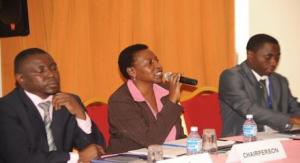WHO/EAC regional meeting on alternative livelihoods to tobacco growing
Entebbe, 29th July 2014:- The East Africa Community (EAC) secretariat with support from the World Health Organization (WHO) organized an inter country meeting that discussed alternative livelihoods to tobacco growing. The Chairperson of the meeting, Miss Tabitha Masinjila who is also the Senior Assistant Director, Regional Integration, Ministry of East African Affairs, Kenya, said it was high-time, alternatives get sought for so as not to leave those farmers that may have stopped tobacco farming with no source of income.
The meeting was in line with Articles 17 and 18 of the WHO Framework Convention on Tobacco Control (WHO FCTC) that require Parties (Countries), to cooperate with each other and with competent international and regional intergovernmental organizations, to promote, as appropriate, economically viable alternatives to tobacco growing.
Presently, the Tobacco Industry (TI) is promoting tobacco growth in virgin areas where the communities are not aware of its negative effects. It’s further observed that the TI is also sponsoring farmers to use the media to give testimonies of the alleged benefits accruing to tobacco growing.
Currently contract farming is the dominant method used by transnational tobacco companies like British-American Tobacco (BAT) in the East African region, to organize and secure supply in tobacco growing regions. Through contract farming, smallholders are provided with; access to loans, allowing them to ‘buy’ capital for production such as land, inputs (fertilizers, seeds), technical advice for growing the crop, and a guaranteed market (companies guarantee they will buy a fixed quota per year).
However, existing studies in the region prove that tobacco may not always produce the best economic return in terms of farm-level production.
In Uganda for example tobacco farming takes place in Western (Kanungu, Rukungiri districts), Northern (Masindi, Arua, Maracha and Zombo districts) regions. However, most of the tobacco cultivation (about 75%) takes place in Arua, Maracha and Zombo districts in the West Nile region.
Case in point, a study done by the Centre for Tobacco Control in Africa (CTCA) in conjunction with the Ministry of Agriculture, Animal Industry and Fisheries (MAAIF) in the tobacco growing districts of Arua, Maracha and Zombo, in the West Nile region of Northern Uganda in 2012, shows that this myth is far from true and the results from the cost benefit analysis of tobacco and other alternatives show that many other crops like coffee, ground nuts, and beans actually outcompete tobacco in terms of net returns per acre annually.
The World Health Organization Representative Dr. Wondimagegnehu Alemu in a speech read for him by the WHO Technical Officer, Mr. William Onzivu, pointed out that, “The labour intensive nature of tobacco growing has largely contributed to the increasing drop-out rate of school-going children in the tobacco growing communities as farmers opt for cheap family labour consisting of mainly women and children. Tobacco is also a vulnerable crop that is heavily dependent on repeated application of agro-chemicals like pesticides and herbicides which are highly toxic and expose farmers to ill-health and pollute the food chain on top of degrading soil bio-diversity.”
This meeting was held with the objective being; to promote economically sustainable Alternative Livelihoods (AL) to tobacco growing in the East African Community Partner States, basing on the locally identified, and available viable options in the region.
It is a joint effort of all the East African countries along the World Health Organization regional Office for Africa and the objectives are to be met by all parties in the Region i.e. Kenya, Uganda, Tanzania, Burundi and Rwanda.
_______________________________________________________
For more information, please contact:
Mwebembezi Edmond, Public Information Officer
World Health Organization
Plot 60, Prince Charles Drive, Kololo
Tel. +256 313 33550
Cell: +256 782 962674



